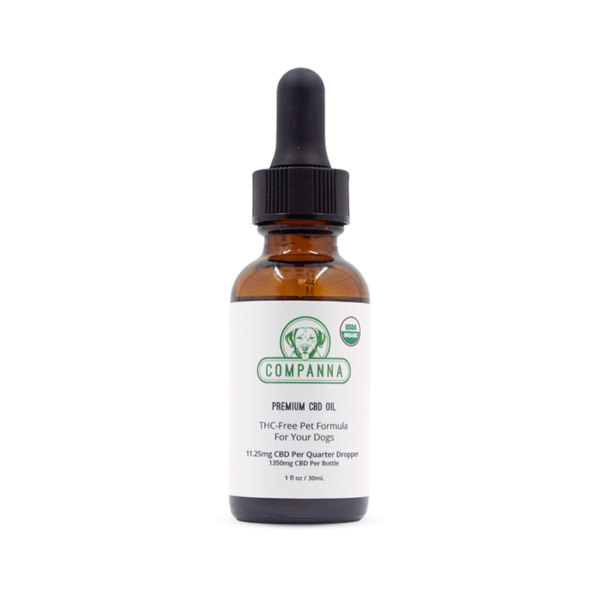CBD for pets – can it help my buddy?
Cannabidiol (CBD) products are gaining a lot of traction among consumers and dogs alike. With the use of CBD on the rise, pet owners and veterinarians alike are now wondering whether it might be a viable alternative for a variety of pet health problems. Early research is promising, but working with a veterinarian who is knowledgeable about CBD products for pets is suggested if you want to give it a shot for your pet.
Here, we’ll go through current CBD research, whether it’s safe for pets to consume, and whether it might be the best option for your pet.
What is CBD?
The marijuana plant’s two primary active components are delta-9-tetrahydrocannabinol (THC) and cannabidiol (CBD). THC is the chemical that causes marijuana users to feel euphoric or “high.” CBD, on the other hand, does not produce a “high” and appears to be beneficial to one’s health.
Many individuals across the United States may buy CBD products in stores and online, according to state laws.
However, the FDA has yet to determine whether CBD is safe as a food additive, dietary supplement, or pet treatment. CBD is currently the only FDA-approved human medication that contains it, but no medications have been authorized for use in animals.
What kind of research has been done on the effects of CBD for pets?
Unfortunately, there isn’t much research when it comes to CBD for pets. Currently, veterinarians’ professional experiences are used as guidelines, although they are based on very small studies.
As CBD’s popularity and usage in pets grows, more studies will be completed, giving both veterinarians and pet parents improved information on how to utilize these treatments.
CBD for pets – is it safe?
The FDA has not designated any CBD medications or over-the-counter treatments for use in animals, so it’s critical to keep that in mind. This implies that the items on the market have not been evaluated for safety or efficacy beforehand. And some businesses may make unverified medical claims about their goods without having undergone study or approval, either.
There are also concerns about CBD product quality. The product might have a different amount of CBD than what’s stated on the label, or it may be tainted with THC or pesticides. If you decide to use CBD for your pet, you’ll have to do some more research to figure out how the product you’re buying is produced.
Check the manufacturer’s website or contact the firm to inquire about their Certificate of Analysis (COA). The ingredients printed on the label are verified by this open document, which assures that they are actually in the product. If a firm is unable to provide you with the most up-to-date COA, it’s not worth buying from them.
Are there risks when it involves CBD for pets?
CBD has been shown to have anti-inflammatory, anti-anxiety, and neuroprotective properties in humans. The side effects of CBD for pets, usage in animals are comparable to those seen in people. The most typical symptoms are an increase in appetite, tiredness, and diarrhea. The more CBD you give to your pet, the more probable it is that they will experience negative effects.
It is not often necessary to treat these symptoms in most situations, as they are rarely serious or improve with time. If these adverse effects do not improve or become more severe, you should contact your pet’s veterinarian and keep a close eye on your pet to ensure they don’t harm themselves.
Can CBD cause my pet to get high?
CBD does not produce a “high” or euphoric sensation, as it is not psychoactive. Some consumers, on the other hand, have claimed that when they consume CBD, their dogs seem to be a little out of sorts. If your pet appears to be “high” following their prescription, there is a reason.
When purchasing CBD oil, keep in mind that the label contains critical information about its components. If the product is called “full spectrum,” this implies it may contain up to 0.3% THC, which is the legal limit set by the Agriculture Improvement Act of 2018. Even a tiny amount might be enough to trigger this adverse effect in your pet, especially if they are extra sensitive to it.
What forms of CBD are available for pets?
If your veterinarian advises CBD for your pet, you can get CBD pet products such as oils, snacks, topical treatments (lotions, gels, creams), and more. CBD is absorbed into the body through the mouth or under the tongue. When you’re first starting to give CBD to your pet, bottled oils with droppers are easier to increase gradually rather than being limited to a certain amount in a tablet, capsule, or treat.
Are human CBD products safe for pets, or do I need CBD products specifically intended for pets?
CBD is found in similar amounts in pet and human-made goods. As a result, you may give your dog CBD without worry, as long as it’s made for humans. You should follow any recommendations from your veterinarian when giving human CBD to your pet. If the product is not designed specifically for pets, read the label to verify that it does not contain components that are poisonous to dogs, such as chocolate, certain essential oils, and artificial sweeteners.
Furthermore, because they are produced without the aforementioned hazardous substances, pet-specific oral CBD treatments generally have a flavor that is geared toward your pet — such as chicken and fish chews. Be aware that some CBD products have a grassy flavor, which can make it more difficult to offer to your pet. If your dog or cat refuses to eat the product you’ve chosen, try hiding it in a spoonful of peanut butter or their favorite treat.
What CBD dosage should be used for pets?
Because there aren’t any FDA-approved treatments for animals, and because we don’t have many research on safety and effectiveness, further study is required to establish more precise dosages. If your veterinarian recommends CBD, keep in mind that the dose may differ depending on why you’re taking it.
CBD oil has been shown to help relieve the pain, inflammation, and stiffness that accompany osteoarthritis in dogs. Researchers discovered that, when given twice a day at 2 mg per kilogram of body weight, cannabis reduced pain without causing any negative effects in dogs.
Blood tests, on the other hand, revealed that the liver had been harmed. This is why it’s critical that your veterinarian be part of the team to ensure that your pet is being properly monitored.
Because CBD is a new substance for your pet, it’s likewise critical to start them on a low dose and gradually increase it. It’s also crucial to start your dog or cat on a low dose and gradually raise it.
You can begin with a quarter or half of the suggested dosage on the label to determine whether your pet responds well to a little amount of CBD. If symptoms don’t improve after the first dose, your veterinarian may have you repeat the same amount in 30 to 60 minutes and observe how they respond.
There isn’t a lot of data about using CBD in animals, therefore we don’t know what is the greatest possible dosage. To assist your pet’s condition, it’s important to consult with a veterinarian who has used CBD before and determine what dose is appropriate.
What pet health problems might CBD help manage?
CBD has been shown to help animals with a variety of ailments, including inflammatory problems, seizures, pain relief, and anxiety. CBD is effective in treating a wide range of pet health issues, including anxiety and arthritis. The endocannabinoid system (ECS) regulates bodily functions, such as appetite, immune function, and sleep. It’s possible that CBD has so many medical advantages due to this aspect.
Keep in mind that ECSs function differently for every pet, so CBD may work better for some pets than others.
Pain
CBD may assist with inflammation reduction and pain alleviation when it is consumed by an animal’s body. CBD is thought to impact the ECS and other nerves involved in generating pain sensations, according to experts. Specifically, studies have revealed that reducing joint inflammation alleviates the pains and aches of osteoarthritis in dogs.
Anxiety
Many individuals, like humans, suffer from anxiety, resulting in a slew of distressing behaviors such as peeing inappropriately. CBD is supposed to help with anxiety and provide a sense of peace. This is due to the fact that CBD activates areas of the brain similar to those activated by serotonin, which helps us feel happy and calm.
Seizures
CBD has been proved to aid with canine epilepsy by reducing the number of attacks when used together with traditional antiseizure medication. Although experts aren’t sure how CBD works to treat seizures, it is thought to prevent nerves in the brain from firing too much and decrease the number of electrolytes implicated in seizure disorders.
In October 2018, the FDA approved a prescription CBD drug called Epidiolex for two severe seizure disorders known as Lennox-Gastaut syndrome and Dravet syndrome in people. It is also safe for humans and has been studied to be effective in the treatment of TB sclerosteosis complex-related seizures. However, there have been no trials conducted with animals, so it should not be used in pets.
How can I tell if CBD is helping my pet?
Because our dogs are unable to communicate with us whether they are feeling better, the most trustworthy indicator that CBD is effective is to observe their behavior and actions. After giving your pet a dose of CBD, keep an eye on them to see if their symptoms improve or not. Symptom alleviation may take as little as 30 minutes or up to a few weeks of regular usage depending on your pet’s problem.
CBD has different effects on every animal, according to the previous section. If your veterinarian suggests it, you may experiment with a variety of CBD products, dosages, or forms until you discover what works best for your four-legged friend. Finding the ideal product, on the other hand, necessitates time and patience. It is well worth it to see your pet at their peak, happiest form possible.
The bottom line
CBD has shown promise in the treatment of a variety of pet health issues, including anxiety, chronic pain, and seizures. Although we need further research to confirm its advantages, many pet parents are already using CBD with excellent results.
Because these items haven’t been evaluated or authorized by the FDA, you should consult with a veterinarian who has dealt with pets before administering CBD. You’ll work together to come up with a strategy to make your pet feel their best. Read more about CBD products for cats.






